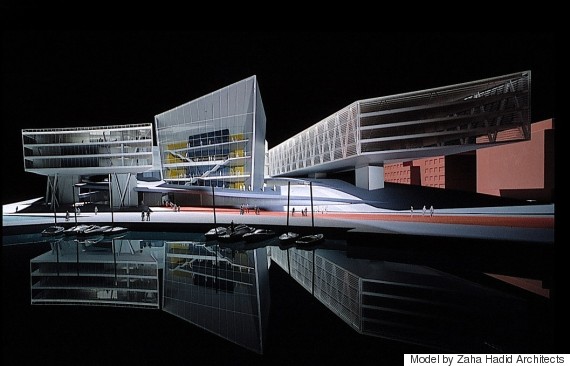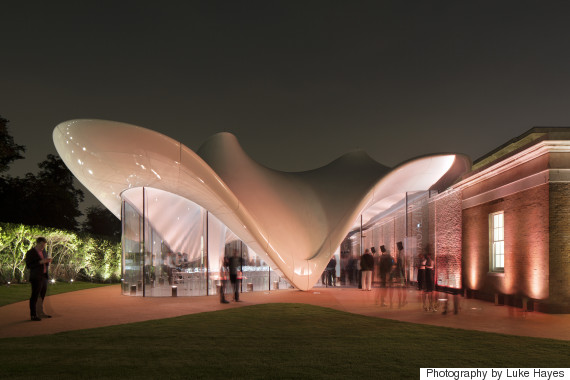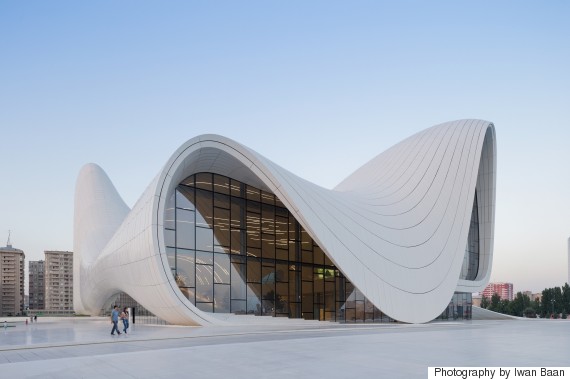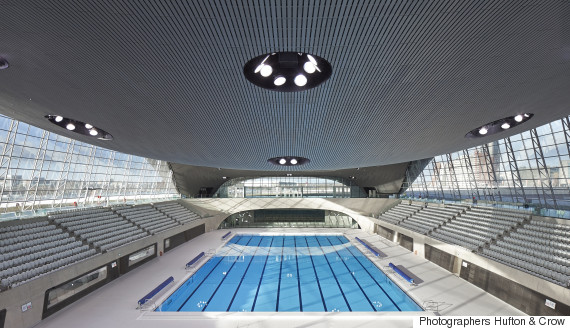
The following interview with Zaha Hadid RA took place in the Royal Academicians' Room in the Keeper's House at the Royal Academy of Arts in London's Mayfair. The invited audience have been generously welcomed by Charles Saumarez Smith, the secretary and chief executive of the Royal Academy, and I ask Zaha:
Zaha, you have said that architecture is not for people who want an easy life. Is this not the case for anyone who wants to excel in his or her job?
There are other professions that are very difficult, but architecture is particularly difficult because your career is reliant on the people you work with, and that's the first hurdle. The second hurdle is the people you work with as a client. You have no control over the developer or the economics. Like when you worked in Cardiff?
Today is 20 years to the day for the Cardiff Opera House project, and people forget what happened. It was a very nasty experience, but it made us much stronger. It's a shame they didn't build the Cardiff Opera House, but I can't have everything.
 (Cardiff Bay Opera House)
(Cardiff Bay Opera House)
You had it particularly tough because your projects are particularly ambitious?
My work is not within the accepted box. Maybe because I am a woman. Also an Arab. There was a certain prejudice about these things.
You became a teacher in important universities all over the world. The Architectural Association, Harvard. Now you teach in Vienna?
I always thought teaching was very important. You learn from what you teach, and show people they can achieve beyond what they thought possible for them to do. What do you teach?
I don't think you can teach architecture, you can only inspire people. In Vienna, it is called a masterclass, because you are a master and the students are with you for five or six years. At the end, the students have learned your repertoire and your expertise.
Do they then come to work for you?
Some of the best people in my studio are from the Vienna program, and also the Architectural Association. I am investing in my studio.
You studied mathematics in Lebanon. Can you say an architect is a mixture of many talents? Drawing, engineering, a diplomat?
Diplomacy! Not my best talent! I don't play up to people. I remember Rem Koolhaas when they asked me to join OMA, and I said, "Only as a partner." I mean, honestly! I had just finished school. And they said, "As long as you are an obedient partner." I said, "No, I am not going to be an obedient partner." That was the end of my partnership! For a long time, you were a theoretician architect. Then something changed and you became a very productive architect, working all over the world?
I always wanted to build what I call the theoretical project. Work on paper was never intended just to be drawing, but to have a productive reality. At the Architectural Association in the early mid-70s, when, post-'68, all faith in architecture had collapsed, they were still dominated by the dogma of modernism. Alternatives were historicism, post-modernism and neo-rationalism. I thought there must be another alternative, and so I started to complete the modernist project, not knowing that in this endeavor I would discover other things.
At the end of the day, your shapes are artistic shapes?
Architecture is semi-artistic, but you are inspired by nature, landscape, biology, all living things. You can be far more ambitious now, you can make great spatial experiences, but one thing which hasn't changed is that we have to deal with gravity, to land on the ground. I learned from a great engineer called Peter Rice to understand the logic of structure.
As an architect you have to know about practical things, for a stadium about security and such things, not only the environment?
You have to know all these things, not completely, but the logic of all these aspects.
Compared to architects of the past like Michelangelo, Alberti, Brunelleschi, Borromini, whose buildings are still here today, do you conceive your work as built to last over centuries?
The idea of time has changed. The world is moving much faster, and they might change these things in mid-century. I can't predict if it will be necessary here in 20 years, or needed there in a hundred years' time. Was the MAXXI contemporary art museum in Rome a very difficult project to achieve, considering the layers of architecture in Rome? An eternal city, where there is so much architecture of so many centuries?
I think Rome is paralyzed by its history, so it needs interventions. I like the MAXXI project in Rome and I remember every line. It was a project on the cusp between my semi-tectonic early work and semi-fluid later.
Are there some projects you like and some you regret?
I have not done too much, so I have not regretted them. We have been lucky in very varied experiences, from building a bridge in Abu Dhabi to the stadium here for the pool, or a school in Brixton, or a cancer facility in Scotland. Mostly they are big projects.
You also design furniture. Do you like that?
I think it's fun to do, it's like making a model. You design and within a few months make, unlike architecture which takes a very long time. A chair is the most significant thing, but we still have not done a chair.
 (Serpentine Sackler Gallery, London)
(Serpentine Sackler Gallery, London)
Why is your office in London?
I am a very stubborn person. First, I like London. A great city that has become a greater city in the last 20 or 30 years. I always thought London has great potential in terms of architecture. It's proven to me, great potential, but not for myself!
London is your base. How much time do you spend here?
A lot, I am trying not to travel so much. I am very lucky to have lots of people in the office who can travel for me. I like to travel, but it's very exhausting.
You said Rome was difficult, but China, Japan, Azerbaijan, Beijing were easier?
Not easier, but it depends on the client. China, although they say they are difficult, they are not. I find China relatively comfortable to work in.
What is the process, how do you start working on a project?
It has changed. We used to start working with a sketch, a model, a painting or a model cross-section. With digital and visual technology, the skill base has changed. We still look at work in a three-dimensional way. It is not a linear process, it is a very back-and-forth process. Are there many things you can do today with the new technologies?
There's more precision and it's seamless on many layers, not only on the design, but seamless on the process, from the design to engineering to manufacturing to construction. I think that's very exciting.
Often to win a job you have to win a competition?
Although competitions are very expensive and sometimes a waste of time, some of the best ideas came out of working against time, without client intervention, in a different kind of space mentally.
Is the cost of the building one of the most significant issues? Do you have to be good at economics, too?
I know what is going to become expensive and what is cheap. I think it is very important that a project is affordable.
Is common sense an essential quality for your job?
To know where the limits are, but having said that, I think it's also very important that cities have great work. Cities should invest in good spatial organization that has more impact than just making a terrible cheap building, which you see a lot of.
In Hong Kong you won a competition but you didn't build it. How did you feel?
When Margaret Thatcher went to Hong Kong, that was the end of that project. It was early in my career and the number of lessons I learned is far greater than if I had built it.
The project is still there. Would it change enormously if you did it now?
I still believe in the carved mountain idea that came into play in terms of landscape and typography in many other projects later. The idea of layering was the most important idea, that you can build almost simultaneous; as if the layering is compressed in one single moment of time instead of a thousand years.
Is there a fil rouge, a guiding light in your work?
The common thread was abstraction; now it is complexity. Thirty years ago it had to do with the modernist ideology, with mass production. To challenge that idea was much more complex, and also the idea of typology changed a lot. Typology was there as one type of library, of office building, of apartment, and I thought you could challenge these. From the 20th century it came out that the public domain is very important.
 (Heydar Aliyev Center, Baku, Azerbaijan) What is the public domain?
(Heydar Aliyev Center, Baku, Azerbaijan) What is the public domain?
Put a building on a particular site, part of a city, and you engage the site in the life of the city. Exactly as you do the squares in Rome. In London, the squares are private. It is very important to create these public spaces.
You do monuments, public buildings, but what has influenced your taste, your fantasy?
I was influenced by the modernists, but also by constructivism, and the Russian experiment was never fully tested. I became interested in how the site influences the project. What emerged was to look at what I call a field, and the field becomes another topic.
When they invite you to do a hospital, a stadium, a church -- do you first have an idea that very often becomes the project? Through intuition?
No, all these things come together. You are constantly thinking about what to do for the next space or tower. When you get site-specific, you might test some of these ideas on that particular site. The swimming pool stadium in London was from a competition. How did it proceed in your mind?
Of course water, the pool, the idea of the wave was an obvious idea, and we were interested in the typology of the landscape and computation of the idea of the wave.

(The 2012 London Aquatics Center)
You said it was tough to be an Arab, a woman, also to be a Muslim?
I come from Iraq, and there were many Christians there and lots of Jews and Muslims. I am a Muslim who went to a nun's school, and for six years of my life, I crossed my heart. There was no difference between the Christians and the Muslims.
Sometimes wars are very troublesome for architecture. Have you seen many disasters?
I used to live in Beirut and that was completely destroyed.
What do you feel about Aleppo?
It's very disturbing. It's not just the architecture, it is about the people who are there. It doesn't matter if you are from the region or not. If I see people from Africa, I am not from Africa, but I feel for them. At this day and age, there should be no fighting. It is very sad. Do you think it's a good historical moment for architecture?
It's been a great moment for the past 10 or 15 years. I am always very wary, because I think the pragmatists, the conservatives, are always lurking around the scenes, happy to leap out any minute and scuttle anything interesting.
I was thinking about Rome in another way: What about Fascist architecture?
It is now in London, it has migrated from Italy to the U.K.! I don't think you can separate architecture from the situation. Some of these buildings are, of course, very monumental and very interesting, but if you look at that period in Germany it's very austere and extremely oppressive.
Are you very comfortable in England?
No, I am not comfortable in England. I like London. I would just say, "I have no work in London!" It's not out of choice.
How about in the USA, a country that loves architecture?
We are doing a tower in Miami, a building in New York. My two earlier projects, one was in Cincinnati, we had another museum in Michigan. What's the difference between England and America?
In America, they mostly do metal steel frame, repetitive floors. Like London, most of the work is corporate, either residential or offices, not like Europe where they have invested in cultural buildings. When it is booming in America, they like architecture; when it is not booming, they don't. That's why I say, as an architect, you are in the hands of fate.
What are your frustrations?
I don't have any frustrations. If you want an easy life, don't be an architect. Ask anybody in my office. You have to work all the time. If you want a nine-to-five job and to go home and relax, just don't do it.
Is it not the same for any artist?
The artist is the same. Architects have to organize a plan: you enter here, walk through there, you understand the stairs, make a room. Is it the right size, the wrong size? It is exactly like writing. This is the composition, and also you have to edit it, over and over again, so that it looks seamless and effortless. What are the things you like the least and make you impatient?
People not understanding what I am saying to them! That is the most flustering thing. But if you have trained them, they understand you better. I'll be honest, it's very difficult to explain things to men. It's virtually impossible. The older generation in my office think they know everything better than anyone. The younger generation are much more flexible and adaptable. Sloppiness irritates me the most.
But the world today?
I am not hysterical about it, but I would like them to be less sloppy! You seem to have a very special feeling for Rome?
My parents took me to Rome when I was seven years old and it stayed with me. That flamboyancy of Italy was similar to Beirut. I love those cities, Baghdad or Cairo, which are very tense and dense and with rivers. I am not a romantic but there is something about waterways in that part of the world which has a certain resonance.
Are you inspired by Istanbul?
Istanbul is one of my favorite cities, I love it. It's a kind of composite. I like that Sinan wanted to do these cupolas as if it was a mountain. The Roman Istanbul alone is stunning.
And you like the Greek monuments, too?
I do. I like many things. This is what you learn from. When you do something you don't have to repeat it, but you can learn from it. Do you dream of building something in particular?
A project on the level of urbanism and architecture. There are some enormous sites being developed, and I would love to do something in London, but I am not keeping my fingers crossed.


